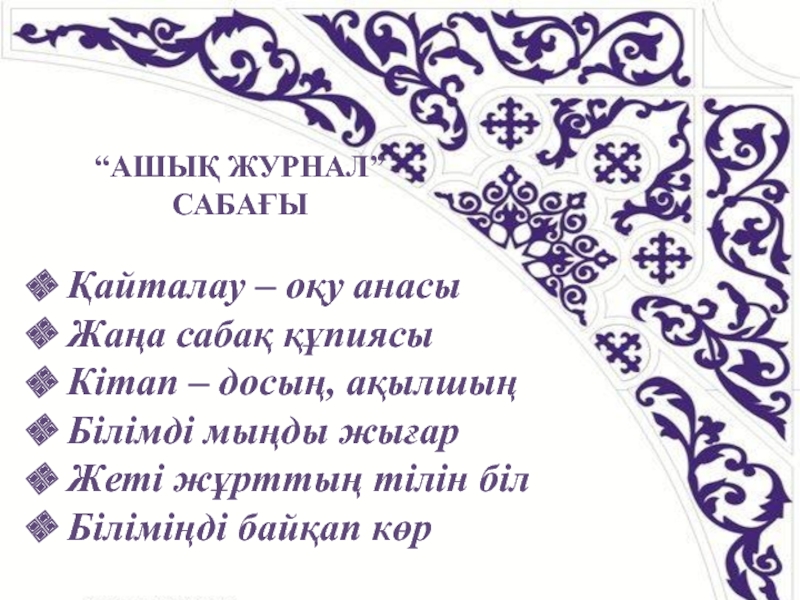- Главная
- Разное
- Образование
- Спорт
- Естествознание
- Природоведение
- Религиоведение
- Французский язык
- Черчение
- Английский язык
- Астрономия
- Алгебра
- Биология
- География
- Геометрия
- Детские презентации
- Информатика
- История
- Литература
- Математика
- Музыка
- МХК
- Немецкий язык
- ОБЖ
- Обществознание
- Окружающий мир
- Педагогика
- Русский язык
- Технология
- Физика
- Философия
- Химия
- Шаблоны, фоны, картинки для презентаций
- Экология
- Экономика
Презентация, доклад по английскому языку на тему Из истории английского языка
Содержание
- 1. Презентация по английскому языку на тему Из истории английского языка
- 2. Before English The various dialects spoken by the
- 3. An OverviewPeriods in History of English Old English: 449-1066 Middle English: 1100-1500 Modern English: 1500 on
- 4. Old English (500-1066 AD) West Germanic invaders
- 5. Old English (500-1066 AD)These invaders pushed the
- 6. Influence of Old EnglishThe majority of words
- 7. BeowulfOld English, whose best known surviving example
- 8. The Lord’s Prayer in Old English (c.
- 9. The Norman Conquest and the Development of
- 10. Norman Influences: LatinPrior to the Norman Conquest,
- 11. The Merging of Two Languages The influence of
- 12. Middle English: 1100-1500It was not until the14th
- 13. Middle English: 1100-1500The most famous example of
- 14. Early Modern EnglishThe Middle English period came
- 15. Early Modern English (1500-1800)The Renaissance brought the
- 16. ShakespeareShakespeare wrote in modern English. Elizabethan English
- 17. ShakespeareNewcomers to Shakespeare are often shocked at
- 18. The Influence of the Printing PressThe last
- 19. StandardizationThe printing press brought standardization to English.
- 20. “Standard English”Many find the term standard English
- 21. Late Modern English (1800-Present)The principal distinction between
- 22. English VocabularyThere are 600,000 words in the
Before English The various dialects spoken by the Germanic tribes are known as Pre-Old English. The term England developed later from the tribal name Angles, possibly because this kingdom was dominant. The term Anglo-Saxon referred to the
Слайд 2Before English
The various dialects spoken by the Germanic tribes are known
as Pre-Old English. The term England developed later from the tribal name Angles, possibly because this kingdom was dominant. The term Anglo-Saxon referred to the West Germanic tribes generally. Old English was not entirely uniform and four main dialects were predominant: Northumbrian, Mercian, West Saxon, and Kentish. Nearly all of Old English literature is preserved in the West Saxon dialect.
Слайд 3An Overview
Periods in History of English
Old English: 449-1066
Middle English: 1100-1500
Modern English:
1500 on
Слайд 4Old English (500-1066 AD)
West Germanic invaders from Jutland and southern Denmark—the
Angles, Saxons, and Jutes— began to settle in the British Isles in the fifth and sixth centuries AD. They spoke a mutually intelligible language that is called Old English. Four major dialects of Old English emerged, Northumbrian in the north of England, Mercian in the Midlands, West Saxon in the south and west, and Kentish in the Southeast.
Слайд 5Old English (500-1066 AD)
These invaders pushed the original, Celtic-speaking inhabitants out
of what is now England into Scotland, Wales, Cornwall, and Ireland, leaving behind a few Celtic words. These Celtic languages survive today in the Gaelic languages of Scotland and Ireland and in Welsh. Cornish, unfortunately, is, in linguistic terms, now a dead language.
Слайд 6Influence of Old English
The majority of words in modern English come
from foreign, not Old English roots. Only about one sixth of the known Old English words have descendants surviving today. But this is deceptive; Old English is much more important than these statistics would indicate. About half of the most commonly used words in modern English have Old English roots. Words like be, water, and strong, for example, derive from Old English roots.
Слайд 7Beowulf
Old English, whose best known surviving example is the poem Beowulf,
lasted until about 1100, just after the most important event in the development and history of the English language—the Norman Conquest in 1066.
Слайд 8The Lord’s Prayer in Old English
(c. 1000AD)
Fæder ure þu þe eart
on heofonum
si þin nama gehalgod tobecume þin rice gewurþe þin willa on eorðan swa swa on heofonum
urne gedæghwamlican hlaf syle us to dæg
and forgyf us ure gyltas swa swa we forgyfað urum gyltendum
and ne gelæd þu us on costnunge ac alys us of yfele soþlice.
Слайд 9The Norman Conquest and the Development of Middle English (1100-1500)
William the
Conqueror invaded and conquered England and the Anglo-Saxons in 1066 AD.
Слайд 10Norman Influences: Latin
Prior to the Norman Conquest, Latin had been only
a minor influence on the English language, mainly through vestiges of the Roman occupation and from the conversion of Britain to Christianity in the seventh century (ecclesiastical terms such as priest, vicar, and mass came into the language this way). Now there was a wholesale infusion of Romance (Anglo-Norman) words.
Слайд 11The Merging of Two Languages
The influence of the Normans can be
illustrated by looking at two words, beef and cow. Beef, commonly eaten by the aristocracy, derives from the Anglo-Norman, while the Anglo-Saxon commoners, who tended the cattle, retained the Germanic cow.
Many legal terms, such as indict, jury, and verdict have Anglo-Norman roots because the Normans ran the courts. This split, where words commonly used by the aristocracy have Romantic roots and words frequently used by the Anglo-Saxon commoners have Germanic roots, can be seen in many instances.
Many legal terms, such as indict, jury, and verdict have Anglo-Norman roots because the Normans ran the courts. This split, where words commonly used by the aristocracy have Romantic roots and words frequently used by the Anglo-Saxon commoners have Germanic roots, can be seen in many instances.
Слайд 12Middle English: 1100-1500
It was not until the14th century—300 years later—that English
became dominant in Britain again. In 1399, King Henry IV became the first king of England since the Norman Conquest whose mother tongue was English. By the end of the 14th Century, the dialect of London had emerged as the standard dialect of what we now call Middle English.
Слайд 13Middle English: 1100-1500
The most famous example of Middle English is Chaucer's
Canterbury Tales.
Unlike Old English, Middle English can be read, albeit with difficulty, by modern English-speaking people.
Unlike Old English, Middle English can be read, albeit with difficulty, by modern English-speaking people.
Слайд 14Early Modern English
The Middle English period came to a close around
1500 AD with the rise of Modern English.
Слайд 15Early Modern English (1500-1800)
The Renaissance brought the revival of classical scholarship
and brought many classical Latin and Greek words into the Language. These borrowings were deliberate and many bemoaned the adoption of these "inkhorn" terms. Many survive to this day.
Слайд 16Shakespeare
Shakespeare wrote in modern English. Elizabethan English has much more in
common with our language today than it does with the language of Chaucer. Many familiar words and phrases were coined or first recorded by Shakespeare. Some 2,000 words and countless idioms are his.
Слайд 17Shakespeare
Newcomers to Shakespeare are often shocked at the number of clichés
contained in his plays, until they realize that he coined them and they became clichés afterwards. "One fell swoop," "vanish into thin air," and "flesh and blood" are all Shakespeare's. Words he bequeathed to the language include "critical," "leapfrog," "majestic," "dwindle," and "pedant."
Слайд 18The Influence of the Printing Press
The last major factor in the
development of Modern English was the advent of the printing press.
William Caxton brought the printing press to England in 1476. Books became cheaper and literacy more common. Publishing for the masses in English became profitable.
William Caxton brought the printing press to England in 1476. Books became cheaper and literacy more common. Publishing for the masses in English became profitable.
Слайд 19Standardization
The printing press brought standardization to English. The dialect of London,
where most publishing houses were located, became the standard.
Spelling and grammar became fixed.
The first English dictionary was published in 1604 (Cawdrey’s A Table Alphabeticall).
Spelling and grammar became fixed.
The first English dictionary was published in 1604 (Cawdrey’s A Table Alphabeticall).
Слайд 20“Standard English”
Many find the term standard English to be inaccurate and
misleading because it creates a false impression that there exists a single variety of English that all educated Americans speak and write.
Edited written English
Edited written English
Слайд 21Late Modern English (1800-Present)
The principal distinction between early- and late-modern English
is vocabulary.
Pronunciation, grammar, and spelling are largely the same.
New words are the result of two historical factors:
the Industrial Revolution
the British Empire.
Pronunciation, grammar, and spelling are largely the same.
New words are the result of two historical factors:
the Industrial Revolution
the British Empire.
Слайд 22English Vocabulary
There are 600,000 words in the English language.
The average
college student may have a vocabulary of 80,000.
Nearly 60% of all he or she says is said with just 100 different words.
Nearly 60% of all he or she says is said with just 100 different words.



























